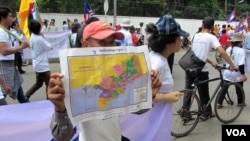Some 200 Kampuchea Krom asylum seekers who fled Vietnam claiming persecution have called on the United Nations Refugee Agency to speed up their applications.
Advocates for the asylum seekers said the group, who are from a Khmer ethnic minority group living mostly in southern Vietnam, faced numerous challenges in Thailand, including living as undocumented immigrants while their applications were processed, risking refoulement to Vietnam.
Prak Sereivuth, president of the Khmer Kampuchea-Krom Federation (KKF), a lobby group, led a delegation to Washington last week to advocate for the asylum seekers’ rights.
He told VOA Khmer that third-country resettlement has proved difficult for the group.
"The refugee issue, as we inform the US Department of State, is that they will help intervene with the United Nations Refugee Agency in Bangkok. How much they can do, we don’t know. They will talk, and also we tell them about 205 Khmer Krom people in Thailand, some of them are recognized as refugees, yet they have not been sent out to a third country. There are still fully stuck over there. And some of them are asking for interviews and be assessed as to whether they are refugees or not, and a small number are not recognized as refugees," he said.
Tran Mannarinh, the KKF’s director of planning, said the lack of official documentation of the group had effectively rendered them stateless.
“Vietnam mistreated us so we fled to Cambodia and Cambodia just gave us empty words, causing problems for the Khmer Krom, who fled to Thailand,” he said.
Thach Soong, 59, fled his hometown in 2001 with his five children after he says they were targeted by the Vietnamese authorities.
"Because I cannot live in my homeland in the Khmer Krom territories, we know that Vietnam is always looking for us as they accused us of being provocative to national social stability. We were accused of being traitors because we made a demand for religious freedom and human rights," he said.
Soong was fortunate to be one of the group who were granted asylum in 2014 after many years waiting for his case to be processed, but he has yet to be resettled in a third country.
Thach Thanh Hoang, 37, a former monk, said Vietnamese government religious authorities routinely tried to suppress the Khmer Krom’s religious freedoms. Khmer Krom practice Theravada Buddhism, which differs from the form of Buddhism practiced in Vietnam.
Phil Robertson, deputy Asia director for Human Rights Watch, said Vietnamese authorities regularly persecuted the Khmer Krom and backed up the stories told by the asylum seekers of the difficulties they faced in Thailand.
“Well, I mean the problem is that Cambodia claimed that it protects all Khmer Krom as the citizens of Cambodia but then what happens is that Cambodia doesn’t issue any basic paper work or documents to the Khmer Krom that they need to live in Cambodia and so many Khmer Krom fleeing political persecution, abuses, don’t feel safe in Cambodia and so they continue to flee out of Cambodia to Thailand where they seek refugee status,” he said.
“You know obviously we hope that the UN refugee agency supports those claims and many different countries including Unites States and Canada will find a way to protect the Khmer Krom.”
A UN refugee agency spokesperson Jennifer Harrison in Thailand said careful consideration of the cases must be carried out as “not every asylum seeker is necessarily a refugee”.
“We conduct in-depth interviews to determine who is and isn’t a refugee according to the refugee definition in international law. Each claim is assessed on its own merit and rejected asylum-seekers can request to have their cases reviewed according to a set appeal process. This intensive process is necessary to preserve the credibility of the asylum process, both here in Thailand, as well as globally, as a key human rights instrument and to ensure a fair and efficient process for those in need of international protection.”




